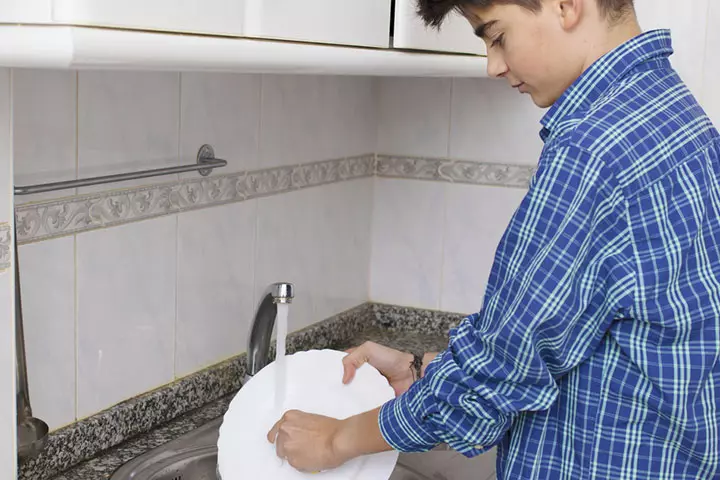
Image: ShutterStock
The significance of discipline for teenagers is high because they are at an age when they can either embark on a commendable life journey or lose their way. As parents, you have to guide them and help them be the best versions of themselves.
That said, different parents define discipline differently. For some parents, it is about keeping a tab and watching over everything their children do; however, for others, it is about having complete faith in their children and giving them absolute freedom to make their own mistakes while occasionally checking on them.
Since this is when they begin developing ideas and forming their own opinions, both approaches are correct. However, choose the right one for your child depending on your family arrangement and expectations.
In this post, we give you a few tips on how to discipline your teenagers and handle the challenges you might face.
Key Pointers
- Setting house rules, taking away privileges, letting them face the consequences, and grounding them if needed are techniques to discipline teenagers.
- You may give responsibilities to teens and befriend them to teach discipline rather than issuing commands.
- Stubbornness, testing patience, power struggle, and short temper are common challenges of disciplining teenagers.
The Importance Of Communication
Good communication is essential for maintaining a positive relationship with your teenager. Encouraging them to share their thoughts and feelings can help build trust, making discipline easier to manage. Parents should create a space where teenagers feel comfortable and understood by listening and responding calmly. This approach can make addressing issues and setting rules easier, as teenagers who feel heard are often more willing to follow guidelines.
Typical Teenage Behavior

For a young child, you are their role model, and they share every small detail with you. However, once they enter their teenage years, they would begin to trust friends more than anyone and be more self-centered.
Although they act responsibly in some aspects, they might be stubborn and throw temper tantrums sometimes. Also, there might be a clash of opinions between you and them.
If your teenager prefers spending more time with their friends and keeping some aspects of their life away from you, do not lose heart, as this is completely normal. It could cause you pain, but let them figure it out gradually.
How To Discipline Your Teenager The Right Way
Disciplining teenagers is essential to keep their changing behaviors in check. Without discipline, your teenager might fall into bad habits and give in to teen peer pressure.
Here are a few positive ways to discipline your child and provide them the right guidance.
1. Ground them, but reasonably

Grounding children is an age-old disciplining technique. You could use it as a last resort. Do not ground them for petty reasons, but if they continue to party late into the night despite repeated reminders or if they skip school and loiter around, they deserve to be grounded.
2. Take away privileges
If your teenager takes your love and care for granted, it is time to teach them the value of the luxuries they enjoy.
However, before you take away their privileges, make sure you communicate to them why you are doing it. Else it might lead to false assumptions and strong protests from your teenager. Also, do not push it too far; limit it to a fixed period.
3. Your house, your rules
It is ok for your teenager to make decisions and handle their life occasionally. But, too much of anything can be harmful. It is important to set house rules for teenagers to maintain decorum. If your teenager disobeys your rules and mocks you for telling them what is right and wrong, it is time to be assertive with them. Let them know that it is your house, and things would go according to your rules.
 Quick tip
Quick tip4. Let them face the consequences
Experience is the best teacher. Sometimes, it is best to let your teenager face the consequences of their actions. However, make sure your child learns a valuable life lesson out of the experience and understand the importance of accountability. Also, talk to your teenager and understand their side of the story to ensure they do not land in trouble.
Jennifer Noble, PhD, a California-based clinical psychologist specializing in adolescence, says, “Continue developing teens’ logic and critical thinking by helping them see that their actions have natural consequences. For example, when your child does not take out the trash, the natural consequence would not be denying access to their phone. A natural consequence would be that the trash was not picked up on the designated day, and the whole family must figure out where to store their trash until the next week. This can cause conflicts with family. The teen would begin to see trash pile up, endure family frustration, and have more work to do the next week. This process of natural consequences would allow the child to make rational, logical choices accordingly.”
5. Do not issue commands

Teenagers tend to rebel and protest when you issue commands. For example, if you say, “Tell me where you are going?” your teenager is likely to stomp their feet and leave. However, if you say, “I worry about you; it would help me calm down if you tell me where you are going,” it could help discipline them positively.
6. Let them mend things
Another way to discipline your teenager is by giving them a chance to correct their mistakes. If they have hurt someone or damaged something, come up with a plan to let them take the responsibility and make amends. It could be going over to the person they have hurt and apologizing or working extra hours to pay for the damages. This will make them think of their actions and their effects, and they might think twice before committing such a mistake.
7. Give them more responsibilities

Want your teenager to understand the value of something? Give them more responsibilities. For example, if your teenager snorts and makes faces when you prepare a decent meal after working two shifts, make them cook dinner for the whole family, or ask them to do grocery shopping for an entire week. This will help them understand your struggle and sacrifices. Besides, it will help them learn self-control and gain maturity.
8. Befriend them
This might not sound like a discipline strategy, but it does more than disciplining your teenager. Making friends with your teenage child will help you gain their trust. Try to spend time with them and make them feel that you respect and understand their feelings. If you can find an activity that you both enjoy, it is the fastest route to befriending your teenager.
Tim Dahi, a parent and writer, shares his approach to bridging this gap. He explains, “Realizing the impact of peer pressure and the changing behaviors of my teenage kids and that I was facing the connecting with my teenagers challenge, I became determined to bridge the gap. I have set some technology boundaries like device-free meal times which they, of course, resisted but the tradition gradually took hold (i).”
Now that you know how to discipline your teenager, let us have a look at the challenges you are likely to face along the journey.
 Quick tip
Quick tip9. Involve them in rule setting
Involving your teenager in setting rules can help them understand the need for boundaries and encourage responsibility. When they take part in this process, they’re more likely to follow the rules and accept the consequences if they’re broken. This approach gives them a say and helps make discipline feel fair and reasonable.
Common Challenges While Disciplining Your Teenager
Disciplining a teenager is no cakewalk. There will be arguments, fights, slamming of doors, and much more, as these are part and parcel of adolescence, and you need to find a way to navigate through these challenges.
- Stubbornness

You might tell your teenager to tidy their room. However, they seldom obey and show stubbornness. The Centers for Disease Control and Prevention estimates that 8.9% of children aged three to 17 encounter behavioral issues. You should put your foot down and make them do it in such instances. They may feel bad during the first few attempts, but slowly they might understand why and start doing it themselves.
- Testing the limits
Teenagers tend to push their luck and test the limits. It could be taking advantage of your softness towards them or getting things done their way. They may fight with you if you say no for a sleepover. Do not let things go out of your hands; if you feel they are testing the limits, tell them firmly what your expectations are, and let them know that they must stick to the plan.
- Comparisons
Teenagers tend to compare their lives with that of their friend’s. They might only see what is visible to the open eye and believe their friends have a restriction-free life. Whenever your child tries to compare themselves with others, tell them each family has its own house rules that need to be followed. Also, tell them how they are failing to see the bigger picture.
- Short temper
It could be the changing hormones or their very nature. Teenagers tend to be short-tempered and snap out at the slightest disagreement. Do not let this happen often. Stop talking to them and walk out of the room. If they follow you, tell them you are ready to speak only when they calm down and talk with respect.
- Power struggle
As soon as children hit adolescence, they feel they are grown up. However, as parents, you would know how naive they can be. There will be a power struggle. During such times, do not get into an argument with them or tell them how wrong they are. Set certain limits and teach them to respect people’s space and freedom as they would want someone to respect theirs.
Frequently Asked Questions
1. How do I teach my teenager to be positive?
You may try following simple techniques–encouraging them to communicate openly, teaching kindness and compassion behaviors, helping them hone their unique skills, avoiding comparisons, and helping them maintain mental and physical health (1).
2. What can I do when my teenager swears at me?
If you notice your teenager using swear words, you may try discussing their meanings and consequences to stop them and encourage them to follow respectful language. Furthermore, you may seek professional help if this behavior persists in your teenager (2).
3. How do I discipline a child who doesn’t care about discipline?
“All teens (and adults) care about discipline! If a teen appears to not care about discipline, it is likely that the method of discipline does not make sense to them or seems inappropriate and pointless. It may feel like a parent controlling them rather than teaching them a life skill. If a parent is administering discipline that a teen feels is pointless or illogical, they will not care about it because they don’t see its purpose.
“Discipline should teach the way of behaving or interacting. Many times parents do not think about the lesson they want to teach and instead punish. They try to match the child’s unwanted behavior with something that will feel painful to them, like removing phones, games, and time with friends. This does not teach the child a different way to handle the situation; thus they will often not care about it,” opines Noble.
Discipline for teenagers is crucial since this phase of adolescence is filled with new experiences and emotional fluctuations. However, disciplining should be done carefully and calmly. If you are wondering how to deal with stubborn teenagers, try to reason things out and not be overly strict. It is common for teenagers to show some attitude and rebel at times, but certain behaviors should not be excused. Hence, emphasizing discipline is vital to ensure their safety. So, try the above-mentioned disciplining tips to deal with disrespectful teenagers and teenage problems and raise responsible individuals.
Infographic: Examples Of Typical Teenage Behavior
“They are just acting like teenagers” — This is a common phrase we hear and say when we see young boys and girls giving an attitude or throwing a tantrum. But what exactly does being a teenager mean? This infographic will help you understand typical teenage behaviors with some easy examples. Illustration: Momjunction Design Team
Illustration: How To Discipline Teenagers? 8 Tips That Will Work

Image: Dall·E/MomJunction Design Team
Discover effective ways for disciplining a non-compliant teenager. Learn helpful tips on creating limits and boosting communication to encourage a peaceful relationship.
Personal Experience: Source
MomJunction articles include first-hand experiences to provide you with better insights through real-life narratives. Here are the sources of personal accounts referenced in this article.
i. My teenagers.https://medium.com/afwp/my-teenagers-65b4148a4be4
References
- Five Ways to Help Teens Feel Good about Themselves
https://greatergood.berkeley.edu/article/item/five_ways_to_help_teens_feel_good_about_themselves - Swearing: school-age children and pre-teens
https://raisingchildren.net.au/school-age/behaviour/common-concerns/swearing#when-children-swear-what-to-do-nav-title - Teens.
https://www.apa.org/topics/teens - Discipline strategies for pre-teens and teenagers.
https://raisingchildren.net.au/pre-teens/behaviour/behaviour-management-ideas/discipline
Community Experiences
Join the conversation and become a part of our nurturing community! Share your stories, experiences, and insights to connect with fellow parents.
Read full bio of Dr. Neha Bhave Salankar
- Dr. Jennifer Noble has over 15 years of experience as a clinical psychologist and 20 years working with the mixed-race community. She did PhD in Clinical Psychology at Alliant International University-Los Angeles and currently works as assistant professor at Pasadena City College.
 Dr. Jennifer Noble has over 15 years of experience as a clinical psychologist and 20 years working with the mixed-race community. She did PhD in Clinical Psychology at Alliant International University-Los Angeles and currently works as assistant professor at Pasadena City College.
Dr. Jennifer Noble has over 15 years of experience as a clinical psychologist and 20 years working with the mixed-race community. She did PhD in Clinical Psychology at Alliant International University-Los Angeles and currently works as assistant professor at Pasadena City College.
Read full bio of Sagari Gongala
Read full bio of Dr. Ritika Shah
Read full bio of Apoorva K





 Did you know?
Did you know?














